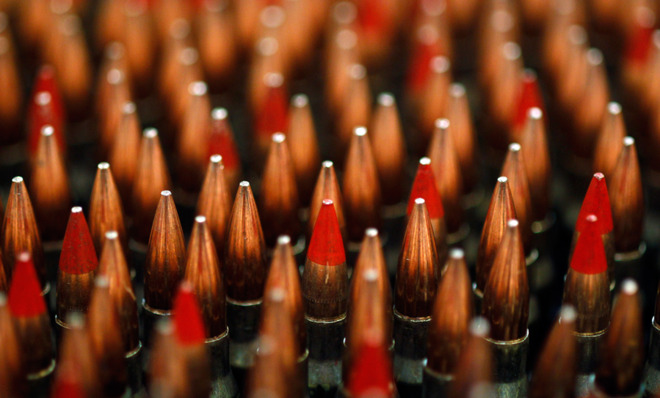Peace-loving Sweden and Switzerland are among the world's top arms exporters
In 2013, their customers included Saudi Arabia, United Arab Emirates, Pakistan, and China

A free daily email with the biggest news stories of the day – and the best features from TheWeek.com
You are now subscribed
Your newsletter sign-up was successful

Sweden and Switzerland have a global reputation for being peace-loving countries.
So it seems counterintuitive that they are also the third and fifth biggest arms suppliers per capita in the world, according to data from the Stockholm International Peace Research Institute and the World Bank.
Israel ranks No. 1, followed by Russia. Belarus is in fourth place.
The Week
Escape your echo chamber. Get the facts behind the news, plus analysis from multiple perspectives.

Sign up for The Week's Free Newsletters
From our morning news briefing to a weekly Good News Newsletter, get the best of The Week delivered directly to your inbox.
From our morning news briefing to a weekly Good News Newsletter, get the best of The Week delivered directly to your inbox.
1. Israel, $97.71 per capita
2. Russia, $57.72 per capita
3. Sweden, $53.05 per capita
4. Belarus, $35.71 per capita
A free daily email with the biggest news stories of the day – and the best features from TheWeek.com
5. Switzerland, $25.63 per capita
Sweden and Switzerland have long maintained neutral positions in international conflicts, preferring instead to offer assistance through peacekeeping missions and foreign aid.
Yet they appear to have no qualms sending their military equipment to regimes accused of human rights abuses.
In 2013, their customers included Saudi Arabia, United Arab Emirates, Pakistan, and China.
The equipment ranged from anti-aircraft guns and naval weapons to planes.
"Swedes see themselves as very ethical and restrictive when it comes to giving human rights violators or dictators things that help them stay in power. But the reality is that has happened," Siemon Wezeman, an arms expert at SIPRI, told AFP.
"In the last decade or so they've been more open to it, because those are the markets."
"In the past they wouldn't have done business with Saudi Arabia due to human rights concerns — it's obviously a place that rings all kinds of alarm bells — but that has changed ... They've sold them Eriye (radar tracking systems) and anti-tank missiles and marketed other weapons there."
And even if Switzerland and Sweden tried to take precautions to ensure their weapons were not used against civilians, in reality there’s very little they can do to stop that from happening.
"It's illusive to believe that Swiss authorities are able to control whether exported Swiss weapons and ammunition are used for human rights abuses," Stefan Dietiker, secretary general of pacifist Group for Switzerland without an Army, told the Inter Press Service.
"Once they've left our country, they're gone, no matter how many clauses the purchasers sign and how many promises they make."
The total value of military equipment exported by Sweden and Switzerland last year was dwarfed by that of Russia, the United States, and China, which were the top three arms exporters, according to SIPRI.
But they still ranked among the top 20 suppliers. Here's the full list.
1. Russia, $8.28 billion
2. United Sates, $6.15 billion
3. China, $1.84 billion
4. France, $1.49 billion
5. Britain, $1.39 billion
6. Germany, $972 million
7. Italy, $807 million
8. Israel, $773 million
9. Spain, $605 million
10. Ukraine, $589 million
11. Sweden, $505 million
12. Belarus, $338 million
13. South Korea, $307 million
14. Netherlands, $302 million
15. Switzerland, $205 million
16. Canada, $199 million
17. Poland, $131 million
18. Romania $108 million
19. Finland, $94 million
20. Turkey, $82 million
This article, by Allison Jackson, originally appeared at GlobalPost.
More from GlobalPost...
- Things are getting even weirder in the "People's Republic of Donetsk"
- These are the 11 trends that are changing your world right now
- The US military describes its biggest mistakes in Afghanistan
-
 A dreamy long weekend on the Amalfi Coast
A dreamy long weekend on the Amalfi CoastThe Week Recommends History, pasta, scenic views – this sun-drenched stretch of Italy’s southern coast has it all
-
 Can foster care overhaul stop ‘exodus’ of carers?
Can foster care overhaul stop ‘exodus’ of carers?Today’s Big Question Government announces plans to modernise ‘broken’ system and recruit more carers, but fostering remains unevenly paid and highly stressful
-
 6 exquisite homes with vast acreage
6 exquisite homes with vast acreageFeature Featuring an off-the-grid contemporary home in New Mexico and lakefront farmhouse in Massachusetts